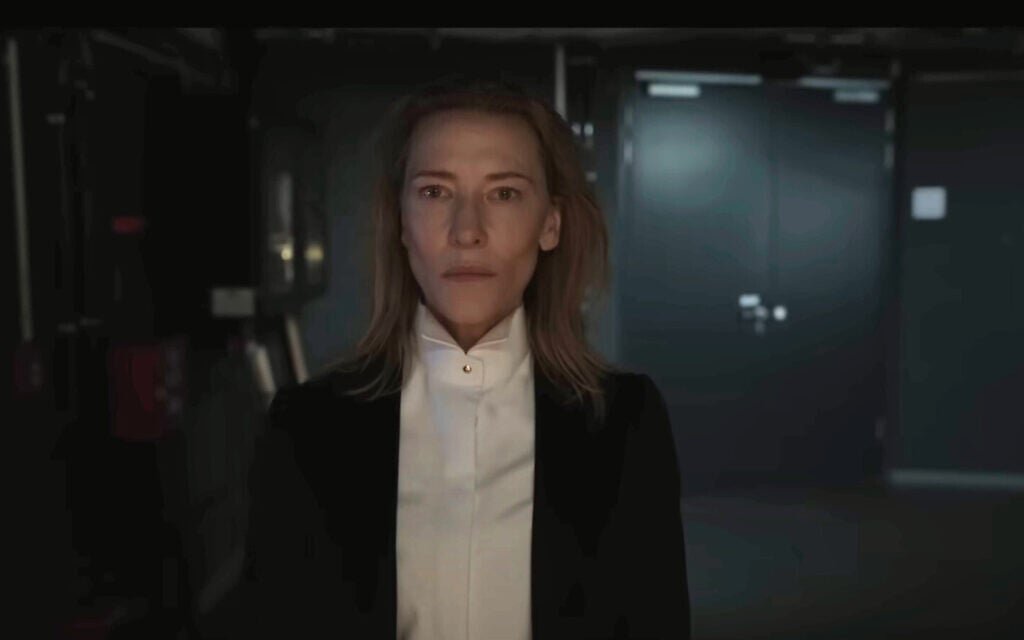
In the world of cinema, there are performances that transcend the screen and leave an indelible mark on the audience. Cate Blanchett’s portrayal of the titular character in the film Tár is undoubtedly one of those rare and exceptional moments. Directed, written, and produced by Todd Field, Tár has been the subject of much critical acclaim, with Blanchett’s performance at the heart of the discussion.
The level of Blanchett’s performance in Tár is truly extraordinary, and many are inclined to consider it the best of her illustrious career. The role of Lydia Tár, a renowned orchestra conductor, was specifically written with Blanchett in mind, a testament to the director’s confidence in the actress’s ability to bring this complex character to life.
In this in-depth blog post, we will delve into the intricacies of Cate Blanchett’s performance, exploring how she masterfully navigates the multifaceted layers of Lydia Tár’s character. We’ll examine the film’s narrative structure, the director’s approach, and the ways in which Blanchett’s portrayal elevates the overall cinematic experience. Join us as we unpack the brilliance of Cate Blanchett’s performance in Tár.
Establishing Lydia Tár’s Public and Private Personas
One of the key aspects that makes Cate Blanchett’s performance in Tár so captivating is the way she seamlessly transitions between the character’s public and private personas. The film presents two distinct profiles of Lydia Tár: the public persona, which is that of a renowned and celebrated orchestra conductor, and the private persona, which reveals a more complex and potentially controversial individual.
In the public eye, Lydia Tár is a towering figure in the world of classical music, a recipient of the prestigious EGOT (Emmy, Grammy, Oscar, and Tony) award. The director, Todd Field, masterfully establishes this sense of fame and reputation, ensuring that the audience understands the magnitude of Tár’s accomplishments and the reverence with which she is regarded in the industry.
However, the film’s focus shifts to Tár’s private life, where the audience is privy to a more nuanced and multifaceted portrayal of the character. Here, Blanchett’s performance shines, as she navigates the complexities of Tár’s personal relationships, her controversial decisions, and the potential conflicts of interest that arise from her position of power.
The contrast between Tár’s public and private personas is a crucial element of the film, and Blanchett’s ability to seamlessly transition between these two aspects of the character is a testament to her exceptional acting skills. She effortlessly conveys the outward confidence and authority of the renowned conductor, while also revealing the underlying insecurities, flaws, and ethical dilemmas that Tár grapples with behind closed doors.
Exploring the Complexities of Lydia Tár’s Character
At the heart of Tár is the exploration of Lydia Tár’s complex character, and Cate Blanchett’s performance is the driving force that brings this multifaceted individual to life. Several key aspects of Tár’s character that Blanchett masterfully portrays:
Exceptional Talent and Reputation: Tár is established as a highly respected and accomplished orchestra conductor, with a reputation that precedes her. Blanchett conveys the character’s deep knowledge, passion, and expertise in the field of classical music, making her a formidable and captivating presence on screen.
Personal Relationships and Conflicts: Tár’s personal life is marked by complex relationships, including her marriage to Sharon (played by Nina Hoss) and the challenges they face. Blanchett navigates these interpersonal dynamics with nuance, revealing the character’s emotional vulnerabilities and the ways in which her personal life intersects with her professional responsibilities.
Ethical Dilemmas and Controversies: The film explores Tár’s involvement in various ethical and professional controversies, which Blanchett portrays with a remarkable balance of subtlety and intensity. She captures the character’s struggle to maintain her public image and reputation while grappling with the consequences of her actions.
Psychological Depth and Transformation: As the narrative progresses, Tár’s character undergoes a profound transformation, and Blanchett’s performance reflects this evolution with remarkable depth and authenticity. She skillfully navigates the character’s emotional and psychological journey, allowing the audience to empathize with Tár’s struggles and complexities.
Blanchett’s ability to seamlessly weave these various facets of Lydia Tár’s character is a testament to her exceptional acting prowess. She effortlessly conveys the character’s intelligence, passion, and authority, while also revealing the underlying vulnerabilities and ethical dilemmas that shape her journey. The result is a captivating and multidimensional performance that elevates the overall cinematic experience of Tár.
The Director’s Approach and Blanchett’s Collaboration
The success of Cate Blanchett’s performance in Tár is not solely due to her own acting abilities, but also the collaborative effort between the actress and the film’s director, Todd Field. Field’s approach to the film’s narrative and character development played a crucial role in shaping Blanchett’s portrayal of Lydia Tár.
One of the key aspects of Field’s directorial approach is his reluctance to serve as a “judge” or moral arbiter for the character’s actions. Instead, he presents the audience with the complexities of Tár’s life and leaves it to them to form their own opinions and interpretations. This approach allows Blanchett to fully inhabit the character, without the constraints of a predetermined moral framework.
Furthermore, the decision to focus the film’s narrative on Tár’s private life and her interactions with the world of classical music, rather than on her public performances, provided Blanchett with the opportunity to delve deeper into the character’s psychological and emotional depths. This emphasis on the character’s inner workings, rather than external spectacle, enabled Blanchett to showcase her remarkable range and versatility as an actress.
The collaborative nature of the director-actor relationship is also evident in the way Field specifically wrote the role of Lydia Tár with Blanchett in mind. This level of intentionality and trust in the actress’s abilities allowed Blanchett to fully immerse herself in the character, bringing a level of authenticity and credibility to the portrayal that is truly captivating.
The seamless integration of Blanchett’s performance and Field’s directorial vision is a testament to the power of collaborative filmmaking. Together, they have created a cinematic experience that challenges the audience’s perceptions and invites deep contemplation, with Blanchett’s performance at the heart of this compelling and thought-provoking exploration.
The Significance of Tár’s Musical Expertise
One of the unique aspects of Tár is the way it delves into the world of classical music, with Lydia Tár’s expertise and passion for the art form serving as a central focus of the film. The director’s approach to this element of the character’s identity is somewhat unconventional, as the film does not necessarily prioritize the musical performances themselves, but rather the character’s deep understanding and engagement with the art form.
Throughout the film, Blanchett’s portrayal of Tár’s musical knowledge and prowess is truly remarkable. She effortlessly navigates complex discussions and debates about classical music, seamlessly incorporating references to renowned composers and musical works. This level of authenticity and attention to detail not only adds credibility to the character but also serves to immerse the audience in the world of classical music, even if the film’s focus is primarily on the character’s personal and professional struggles.
The approach to the musical elements in Tár contrasts with that of other films, such as Whiplash, which placed a greater emphasis on the musical performances themselves. In Tár, the focus is more on the character’s deep understanding and appreciation of the art form, rather than the spectacle of the performances.
This approach, combined with Blanchett’s exceptional portrayal of Tár’s musical expertise, allows the audience to gain a deeper understanding of the character’s motivations, passions, and the ways in which her love for music intersects with her personal and professional life. Blanchett’s ability to seamlessly weave these musical elements into her performance is a testament to her versatility and commitment to the role.
The Impact of Social Media and the “Cancellation Culture”
Another significant aspect of Tár that Cate Blanchett’s performance explores is the impact of social media and the so-called “cancellation culture” on the character’s life and career. The film touches upon the ways in which Tár’s public persona and reputation are shaped and potentially threatened by the power of social media and the potential for public backlash.
Blanchett’s portrayal of Tár’s navigation of this complex and often volatile landscape is both nuanced and compelling. She captures the character’s awareness of the power of social media, as well as the ways in which it can be used to both elevate and undermine her public image. The film’s use of social media, particularly Twitter, is limited, but effectively highlights the gravity of the situations Tár faces.
Blanchett’s performance in these moments is particularly striking, as she conveys Tár’s internal struggle to maintain control over her public narrative while also grappling with the potential consequences of her actions. The character’s awareness of the “cancel culture” and the ways in which it can swiftly and mercilessly turn against public figures adds an additional layer of complexity to Blanchett’s portrayal.
The film’s exploration of these contemporary social and cultural dynamics, as reflected through Blanchett’s performance, serves to further elevate the overall cinematic experience of Tár. It demonstrates the actress’s ability to seamlessly integrate these thematic elements into her characterization, creating a multifaceted and thought-provoking portrayal that resonates with the audience.
The Supporting Cast and Blanchett’s Collaborative Spirit
While Cate Blanchett’s performance as Lydia Tár is undoubtedly the centerpiece of the film, the contributions of the supporting cast, particularly Nina Hoss as Sharon, Tár’s wife, and Noémie Merlant in a supporting role, are also noteworthy.
The supporting characters are not as fully developed as Tár herself, but they nonetheless play an important role in the overall narrative and in shaping the audience’s understanding of the protagonist. Hoss’s portrayal of Sharon, for example, provides a crucial counterpoint to Tár’s public persona, offering a glimpse into the character’s personal life and the challenges she faces within her marriage.
Blanchett’s collaborative spirit is evident in the way she interacts with and supports her fellow actors. The focus of the film is primarily on Tár, but Blanchett’s performance does not overshadow or diminish the contributions of the supporting cast. Instead, she seamlessly integrates her performance with theirs, creating a cohesive and compelling ensemble that enhances the overall cinematic experience.
This collaborative approach is a testament to Blanchett’s skill as an actress and her commitment to the craft of filmmaking. By elevating the performances of her co-stars, she not only strengthens the film’s narrative but also demonstrates her own versatility and generosity as a performer.
Cate Blanchett’s Masterful Performance in Tár
In conclusion, Cate Blanchett’s performance in Tár is a masterclass in acting, a captivating and multifaceted portrayal that elevates the film to new heights. Through her seamless navigation of Lydia Tár’s public and private personas, her exploration of the character’s complexities, and her collaborative spirit with the director and supporting cast, Blanchett has delivered a performance that is sure to be remembered as one of the defining moments of her illustrious career.
Blanchett’s performance in Tár is likely to garner significant critical acclaim and recognition during the upcoming awards season. Her ability to bring such depth, nuance, and authenticity to a complex and challenging character is a testament to her exceptional talent and dedication as an actress.
Cate Blanchett’s performance in Tár is a masterclass in acting, a captivating and multifaceted portrayal that will undoubtedly leave a lasting impression on audiences and critics alike. It is a performance that deserves to be celebrated and studied, a true testament to the power of cinema and the exceptional talent of one of the greatest actresses of our time.


